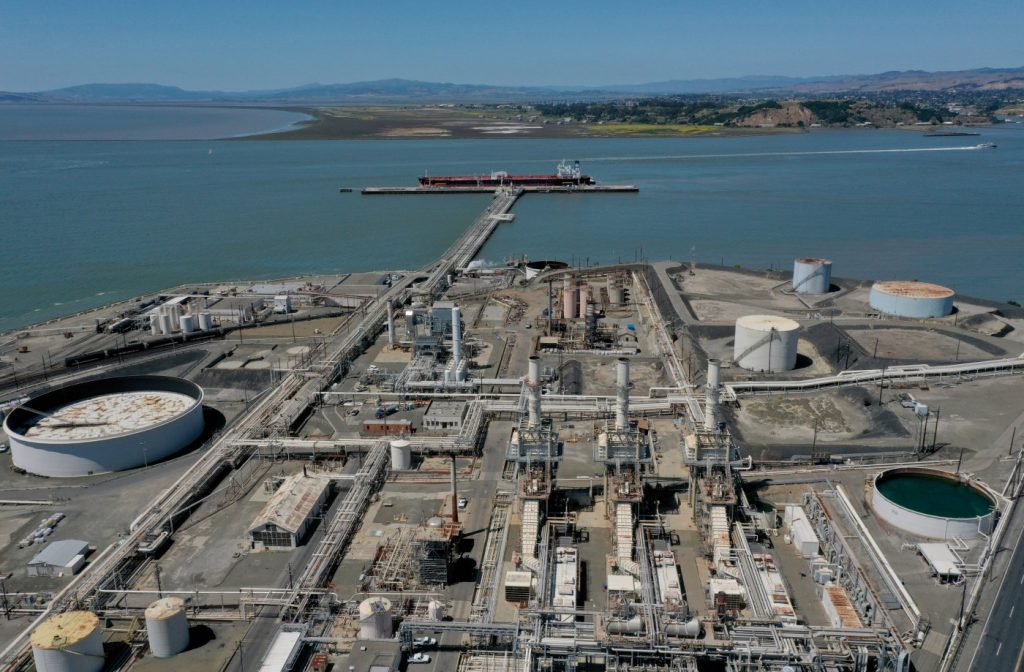With concerns over sustainability increasing in the energy industry, fossil-fuel companies have embraced plans to revamp, rather than decommission, vast networks of steaming, flashing and aging refinery pipelines into more eco-friendly assets.
In 2020, two Bay Area refineries — operated by Phillips 66 in Rodeo and Marathon in Martinez — made a pair of announcements that the facilities would halt petroleum processing and transition into massive renewable fuel plants.
Many California officials are hopeful that biofuel — power sources derived from biomass, such as soybean oil and used cooking oil — may help bolster the state’s ambitious goals to generate less carbon-intense energies and reduce greenhouse gases to a number 40% below 1990 levels by the year 2030.
Martinez’s transition was completed last year; the $850 million “Rodeo Renewed” project proposed for the Phillips 66 refinery will soon permanently shut down crude oil processing at the facility — potentially producing some 800 million gallons of renewable fuels annually.
But despite biofuel’s framing as a green solution, a growing number of environmentalists, scientists and activists are warning against embracing the refining technology. Some argue that biofuels do not adequately mitigate greenhouse gas emissions and that their production generates pollution and disrupts global food supplies.
In their eyes, fossil-fuel producers are using the transition to biofuels as “greenwashing,” an attempt to rehabilitate the industry’s public image using the language of environmentalism.
There may not be many legal avenues for local communities to push back against the transition plans.
“Biofuels” is just the latest evolution of the industry’s deceptive buzzwords, according to Gary Hughes, the Americas Program Coordinator with the nonprofit advocacy group Biofuelwatch. He said the concerns about environmental and health impacts associated with fossil-fuel refining should bring additional scrutiny to the facilities’ operation for biofuels.
“Moving toward biofuels is just a gimmick and a trick to fool the public into going along with something to protect the $60 billion company with toxic, stranded assets sitting on the shore of the Bay,” Hughes said. “It’s a climate dead-end that could very well make the climate situation worse.”
A peer-reviewed study published in early 2022 in the journal PLOS One found that oil companies “are pledging a transition to clean energy and setting targets more than they are making concrete actions.”
In September, California Attorney General Rob Bonta filed a 135-page lawsuit aiming to hold oil and gas companies financially responsible for a “decades-long campaign of deception.”
Hughes pointed to the Marathon refinery in Martinez, which officially stopped accepting crude oil and fully transitioned to producing vegetable oil and animal fats in January 2023. County lawmakers unanimously approved the project in May of 2022, but Hughes cited recent research asserting that flaring immediately ramped up following that refinery’s conversion, largely tied to the more intensive use of hydrogen needed to process renewable diesel.
Last month, several people living in and around Rodeo told county supervisors they were concerned that the Phillips 66 project may soon require some 82,000 truck trips, nearly 29,000 railcars and more than 760 ship and barge visits annually — locking in new but familiar sources of pollution, traffic, accidents and hazardous spills that their community has already weathered for decades.
Commercial operations at the Rodeo plant were expected to come online early this year, but progress ground to a halt in June 2022 after environmental groups filed a California Environmental Quality Act lawsuit, arguing that Phillips 66’s environmental analysis of its project was flawed and that the company “piecemealed” the project — presenting it in stages to make it appear less impactful.
In July, a Contra Costa County Superior Court judge agreed and paused work at the Phillips 66 refinery after finding that the county failed to properly assess the refining operations’ environmental impacts in its drafted report.
Last month, the project got back on track, after the Contra Costa County Board of Supervisors unanimously approved and adopted a “revised final” EIR. Once operational, county staff said, the refinery could supply up to 67,000 barrels of renewable fuels each day, in addition to a side project that would continue to handle 40,000 barrels of petroleum-based transportation fuels. County staff reported that the refinery’s current throughput is 121,000 barrels.
Supervisor John Gioia, who also sits on the California Air Resources Board, tried to allay concerns from residents about emissions from increased crop cultivation, shipping and refining.
“The problem for all of us is how we get to that transition to zero-emission,” Gioia said, adding that progress with electric batteries and hydrogen fuel cells isn’t useful for all necessary transportation, including diesel trucks and airplanes. “Using renewable fuel is less damaging to the climate for that interim period of time.”
After the county approved the project in 2022, Greg Garland, chairman and CEO of Phillips 66, said the project would play “a major role in helping us lower our carbon footprint as we continue to provide reliable, affordable energy.”
“This is a project that will help meet growing demand for lower-carbon fuels, preserve jobs and support California in achieving its climate goals,” he said in a statement.
At the supervisors’ meeting last month, Bobby Thomas, an operations manager at the refinery, said the company did not have any comment on the county’s revisions or the concerns expressed by the public.
Following the meeting, Hughes said he thinks local leaders are prioritizing global climate change goals without considering constituents’ concerns about how the projects will impact their communities.
“The markets and technology-based approaches are, by design, meant to provide the general public with the impression that something is being done about climate, but making sure that business as usual can continue,” Hughes said. “Through this whole process, county decision-makers and the Board of Supervisors have taken a lot of refuge in how state authorities have developed their standards.”
“When you switch over to biofuels, it’s not the case that the pollution concerns associated with oil refining disappear,” said Kerry Guerin, an attorney for Communities for a Better Environment, one of the nonprofit groups that sued Phillips 66 and Marathon in 2022. “We hope for a future where these refineries are decommissioned and no longer operate as refineries that are polluting their communities, whether from crude petroleum or biofuels or something else.”


